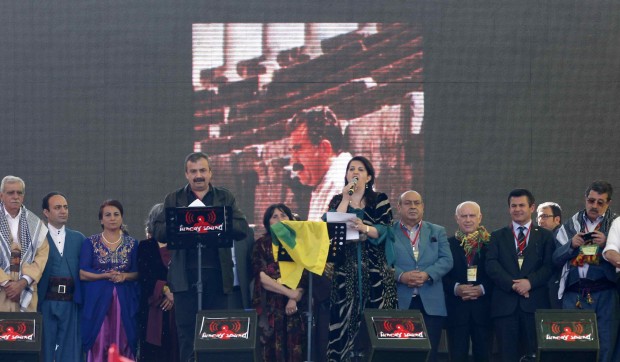
Pro-Kurdish politicians Sirri Sureyya Onder (3rd L) and Pervin Buldan (6th R) read the statement of jailed Kurdish rebel leader Abdullah Ocalan during a gathering to celebrate Newroz in the southeastern Turkish city of Diyarbakir March 21, 2013. Source: Reuters/Umit Bektas
Recent comments from the Kurdistan Workers’ Party (PKK) leader Abdullah Öcalan puzzled groups that have long been allied with his party. In a letter that was read out to crowds gathered for the Kurdish New Year in Diyarbakır a few weeks ago, Öcalan emphasized the role of Islam as forming a strong bond between Kurds and Turks: “Turkish people who know ancient Anatolia as Turkey should know that their coexistence with Kurdish people dates back to a historical agreement of fraternity and solidarity under the flag of Islam.” His proclamations threw off some groups in the Turkish Left and the liberal Left, Armenians and Alevis that sympathized with the PKK and supported its progressive-secular agenda.
Originally founded as a Marxist organization in 1978, the PKK had to revise its ideology in the early 1990s. Like many other Marxist–Leninist organizations in the world, the PKK lost its main source of ideological legitimacy when the Soviet bloc disintegrated and capitalism appeared to have won an absolute victory. Furthermore, Öcalan, as well as others within the PKK leadership, gradually came to the conclusion that Islam was too important for a Kurdish party to ignore, given that many Kurds are devout Muslims.
This shift did not mean that the PKK dropped its secular, progressive discourse, which continued to generate sympathy among Turkish leftist organizations as well as some Western Left and liberal Left academic circles. Rather, it reconciled its secular-nationalist ideology with Islam, hailed as a revolutionary idea by Öcalan in his various writings and speeches. The PKK’s secular allies, which once opted to ignore the stance developed by the PKK on Islam or underestimated it as a conjectural policy, were troubled when they came to understand that Islam is seen as a strategic asset by Öcalan.
Given the fact that the PKK has to compete against Prime Minister Erdoğan’s conservative Justice and Development Party and the extremist Turkish Hezbollah for domination in the Kurdish-majority provinces, it is very logical for the PKK to acknowledge the importance of Islam and act accordingly. In embracing Islam, the PKK may also be able to erase the Turkish public’s opinion of it as an atheist terror organization: the organization could reach wider segments of Turkish society and eventually transform itself into a legitimate political actor in Turkey.
On the other hand, Öcalan’s new discourse will likely alienate some groups among the PKK’s supporters. The Kurdish Alevis and the Kurdish elites living in Europe, with their strong secular tendencies, will not be pleased with the PKK’s embrace of Islam. They may break away from the PKK in order to join other pro-Kurdish organizations, such as the Maoist Communist Party, the Revolutionary People’s Liberation Party–Front, or one of the other Leftist organizations that have accused the PKK of betraying its revolutionary cause and of serving as a tool for imperialism in the Middle East.
Öcalan, who is detained on an island prison in the Marmara Sea, sees the realities of Turkey better than the marginalized extreme Left—and he makes his long-term plans accordingly. In this regard, he recognizes the historic Islamic reality in the Middle East, the need for maintaining good relations with it, and the benefits of exploiting it when and where possible.
